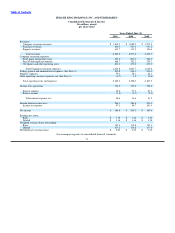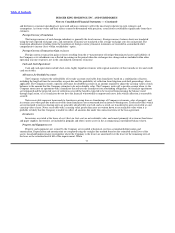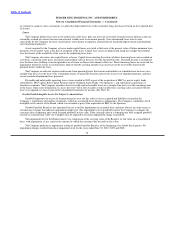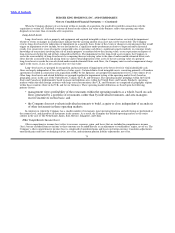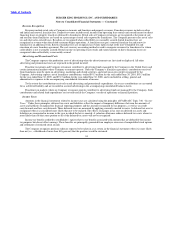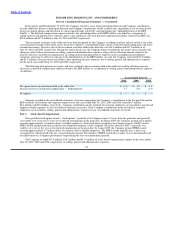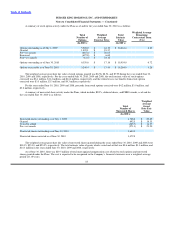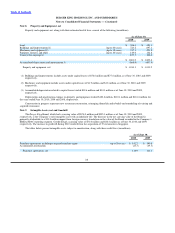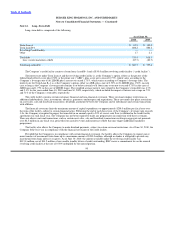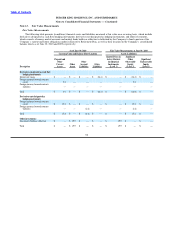Burger King 2010 Annual Report Download - page 85
Download and view the complete annual report
Please find page 85 of the 2010 Burger King annual report below. You can navigate through the pages in the report by either clicking on the pages listed below, or by using the keyword search tool below to find specific information within the annual report.
Table of Contents
BURGER KING HOLDINGS, INC. AND SUBSIDIARIES
Notes to Consolidated Financial Statements — (Continued)
upon examination by tax authorities. A recognized tax position is then measured at the largest amount of benefit that is greater than fifty
percent likely of being realized upon ultimate settlement.
Transaction gains and losses resulting from the remeasurement of foreign deferred tax assets or liabilities are classified as other
operating (income) expense, net in the consolidated statements of income.
Earnings per Share
Basic earnings per share is computed by dividing net income by the weighted average number of common shares outstanding for
the period. The computation of diluted earnings per share is consistent with that of basic earnings per share, while giving effect to all
dilutive potential common shares that were outstanding during the period.
Stock−based Compensation
The Company recognizes share−based compensation cost based on the grant date estimated fair value of each award, net of
estimated forfeitures, over the employee’s requisite service period, which is generally the vesting period of the equity grant.
Stock options and restricted stock and restricted stock units (“RSU”) granted by the Company typically contain only a service
condition for vesting. For performance−based restricted stock and restricted stock units (“PBRS”) vesting is based both on a
performance condition and a service condition. For awards that have a cliff−vesting schedule, stock−based compensation cost is
recognized ratably over the requisite service period. For awards with a graded vesting schedule, where the award vests in increments
during the requisite service period, the Company has elected to record stock−based compensation cost over the requisite service period
for the entire award.
Retirement Plans
Gains or losses and prior service costs or credits related to the Company’s pension plans are being recognized as they arise as a
component of other comprehensive income (loss) to the extent they have not been recognized as a component of net periodic benefit
cost. In the fourth quarter of fiscal year 2009, the Company adopted the measurement date provisions of FASB ASC Topic 715
“Compensation — Retirement Benefits” and recorded a decrease to retained earnings of $0.4 million after tax related to its pension
plans and postretirement medical plan.
The Company sponsors the Burger King Savings Plan (the “Savings Plan”), a defined contribution plan under the provisions of
section 401(k) of the Internal Revenue Code. The Savings Plan is voluntary and is provided to all employees who meet the eligibility
requirements. A participant can elect to contribute up to 50% of their compensation subject to IRS limits and the Company matches
100% of the first 6% of employee compensation. Effective July 1, 2007, the Company added the Burger King Holdings, Inc. Stock
Fund (the “BK Stock Fund”) to the Savings Plan as an investment option. Participants in the Savings Plan may direct no more than 10%
of their investment elections to the BK Stock Fund and no more than 10% of their total account balance.
The Company also maintains an Executive Retirement Plan (“ERP”) for all officers and senior management. Officers and senior
management may elect to defer up to 75% of base pay once 401(k) limits are reached and up to 100% of incentive pay on a before−tax
basis under the ERP. BKC provides a dollar−for−dollar match up to the first 6% of base pay.
The Company established a rabbi trust to invest compensation deferred under the ERP and fund future deferred compensation
obligations. The rabbi trust is subject to creditor claims in the event of insolvency, but the assets held in the rabbi trust are not available
for general corporate purposes and are classified as restricted investments within other assets, net in the Company’s consolidated
balance sheets. The rabbi trust is required to be consolidated into the Company’s consolidated financial statements. Participants receive
returns on amounts they deferred under the deferred compensation plan based on investment elections they make.
82


